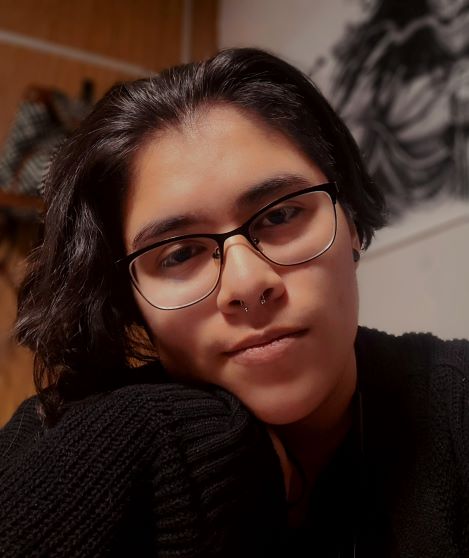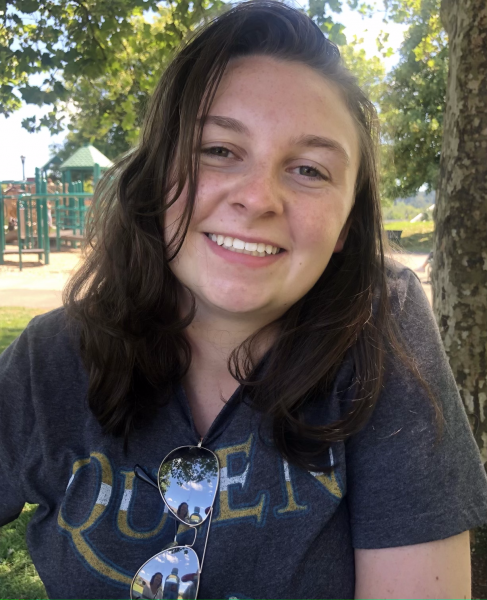When we talk about creative writing, we don’t often talk about all the other things writing is and can be for a writer. It’s so much more than the act of sitting in the chair and typing on a keyboard. Sometimes, writing is missing an old friend, listening to an album over and over, planting a garden. It’s absorbing, thinking, dancing, reading, watching. It’s a train ride. It’s a snow day.

For first-year Marlene Moran, who was recently named a winner of the Department of English’s Creative & Performing Arts Scholarships in creative nonfiction, writing looked like many months not spent writing at all, but rather carefully processing the indefinable nature of grief. Her winning essay, “I Was a Good Man’s Daughter | Fui Una Hija de Hombre Bueno,” details the experience of losing her father in February 2019, told through fragments and in bursts of old memories.
“Grief, I find, harbors a stark detachment to the expectations we are often taught,” said Moran. “The experience is all but blatant and simple.”
Moran began writing the piece as an exercise in closure. “Really, I allowed myself to write anything that came to mind at the thought of him: my first injury (and near-death experience) in his country [Moran’s father is from Guatemala], his first gift to me, his first lesson, his culture.”
Describing her writing process as alternating between fallow periods spent daydreaming and consuming art, followed by moments of her own explosive production, Moran recognizes emotion as the driving force of her creativity.
A self-proclaimed “escapist at heart,” Moran explained that she was first drawn to writing as a child due to her fixation on fantasy worlds, and her desire to replicate such otherworldly places for herself. Now, Moran finds formal inspiration in contemporary short fiction. “I’m inspired by short story collections like those by Carmen Maria Machado and Hiromi Goto. I adore the weird concepts and clever integration of culture and language in shorter snippets of stories. Unlike novels, I can enjoy a brief sense of humor, sublime emotion, or commentary before moving onto a whole new idea.”
On what she hopes to explore next in her work, Moran is excited to examine identity through the bizarre and unconventional. “I really enjoy finding ways to tell a story that is not always traditional or deemed ‘correct’,” she said.
Hear from our Fiction and Poetry Winners

Fiction winner and history major Georgia Riley-Burke credits a family member for providing the spark that would become her winning short story, “The Monkey’s Inn.”
“I started writing this story several years ago but didn’t finish it until last year,” she said. “It was inspired by a story my grandfather told me about when he was working in Malaysia many decades ago. The house that he was staying in had a monkey living in it. The monkey had his own bed and basically did whatever he wanted…Not much of my story is accurate to what my grandfather experienced, but the inspiration can be traced back to that.”
On writing the story from the perspective of an “omniscient-ish narrator,” Riley-Burke noted that the work of T.J. Klune led her to experiment with a new point of view and depart from her typical writing style.
“I always believe that writing what you want and taking risks is so much more rewarding than writing something because you believe it is what others want to read,” she said. “I really wanted to write something that made people say, ‘what did I just read?!’ when they finished it. Some of my favorite stories have left me feeling like that.”

For senior Kobe Overby, inspiration came in another form—specifically, his teal Smith Corona typewriter.
“The smell of the machine is really addictive somehow, like an aromatic blend of metal and ink. I write all my original drafts on it,” he said.
On crafting his winning group of poems, Overby said that while his themes and ideas vary from poem to poem, he enjoys writing about landscapes, birds, the Pacific Northwest, the dead, and various experiences from childhood.
“I try to include surreal descriptions of images in my poetry as well,” he noted.
In particular, Overby admires the work of the New York School poets—including Frank O’Hara, James Schuyler, and Barbara Guest.
Complete list of honorees
CREATIVE NONFICTION
Winner
- Marlene Moran for “I Was a Good Man’s Daughter | Fui Una Hija de Hombre Bueno”
Runners Up
- Josie Brewer for “Strings Attached”
- Tanya Sopkin for “Pigeon Coop”
Honorable Mentions
- Paris Huckaby for “Spring Germination (or self-portrait at 19)”
- Izabelle Hood for “The Sphinx Moth”
- Kyla Ballard for “Unchanged Eyes”
FICTION
Winner
- Georgia Riley-Burke for “The Monkey’s Inn”
Runner Up
- Grace Pixton for “Guardian Angel”
Honorable Mentions
- Caroline Collignon for “Golden Eyes Get Thrones”
- Brier Gunderson for “Perfectly Sick”
POETRY
Winner
- Kobe Overby for Canned Vegetables,” “If I Overextend My Arms, I Can Almost Reach the Surf,” and “Dear Friend”
Runners Up
- Lillian Morton for “/ making an event out of watching the northern star,” “a Parasaurolophus: the spiritual cousin,” “finches in the geriatric ward,” “The year I celebrated Christmas in a penthouse,” and “Taking the old Boy for a last drive”
- Izabelle Hood for “On Bird Songs,” “Hereditary,” “Bird of Prey,” and “St. Sepulcher’s Cemetery”
Honorable Mentions
- Jesse Schaub for “In a Twenty-Four-Hour Café,” “Aubade,” “Rapture,” “Winter Begins,” and “Envoi”
- Kathryn Lopez for “Memories of Dementia,” “7 rules of a housefire,” and “Ways to say ‘I’ve had enough,’”
- German Garcia for “As the Sun Comes Up,” “11:57 pm Habits,” “Apartment Girl,” “Spanish Angels,” and “Damn Spics”
- Carolina Colley for “Inheritance,” “Daily Prayer,” “Ode to Our Bodies in the Rain,” “The Body Doesn’t Understand Distance,” and “Intimacy with Flowers”